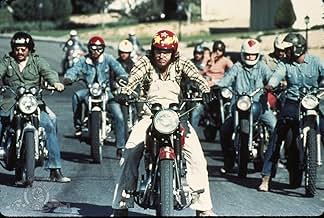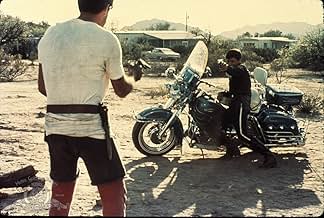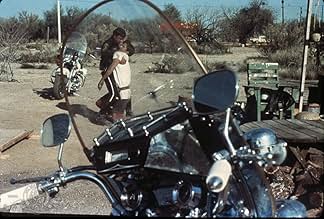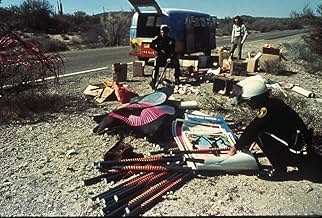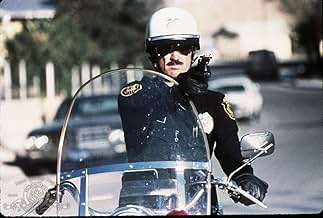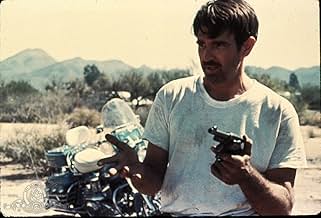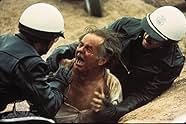IMDb RATING
7.0/10
6.9K
YOUR RATING
A motorcycle cop with a Harley-Davidson ties hippies to a murder in the Arizona desert.A motorcycle cop with a Harley-Davidson ties hippies to a murder in the Arizona desert.A motorcycle cop with a Harley-Davidson ties hippies to a murder in the Arizona desert.
- Awards
- 3 nominations total
Billy Green Bush
- Zipper
- (as Billy 'Green' Bush)
Elisha Cook Jr.
- Willie
- (as Elisha Cook)
Hawk Wolinski
- VW Bus Driver
- (as David J. Wolinski)
Melissa Greene
- Zemko's Girlfriend
- (as Melissa Green)
Featured reviews
An incredible piece of film making, this beautifully shot movie really is about as poetic as it's possible for cinema to be and still have a coherent, gripping narrative. It feels like a western with its dramatic monument valley backdrop and masculine themes, but plays more like a European movie, with it's dark characterisations and existential mood . The soundtrack is fantastic and the feeling the movie imparts is unique. I always recommend this film to people because so few have ever seen it. I think it's a tragedy that James Guercio didn't make more movies because this was his first (and only) film and it's up there with the best of Peckinpah/Leone/Boorman/Seigal (whose work is similar). I'll never forget this film and the ending will live with me forever. If you like movies you need to see this film, This is real Cinema.
A requiem for the death of the American hero. No, this is not the plot--this is what the movie accomplishes. Do not mistake this existential parable for what may otherwise seem like a superficial counter culture exploitation flick--it is nothing of the sort.
Record producer Guercio's first (and last) effort at filmmaking (captured beautifully by the late cinematographer Conrad Hall) leaves the viewer wondering "where have all the cowboys gone?" John Ford taught us that the hero rode a white horse and did the right thing, even if it killed him-, and in this Vietnam era analogue, Blake is a five foot four inch leather clad motorcycle cop writing speeding tickets along a lonely two lane road cutting through monument valley. With high hopes and ideals, he aspires not only to do more but to become more...and for a while he succeeds. But the world is different, people are different, and the old heroes he admired are not just obsolete--they are extinct.
We are inexorably drawn through his disillusionment and our own to an ending that is sad, tragic, and inevitable.
Record producer Guercio's first (and last) effort at filmmaking (captured beautifully by the late cinematographer Conrad Hall) leaves the viewer wondering "where have all the cowboys gone?" John Ford taught us that the hero rode a white horse and did the right thing, even if it killed him-, and in this Vietnam era analogue, Blake is a five foot four inch leather clad motorcycle cop writing speeding tickets along a lonely two lane road cutting through monument valley. With high hopes and ideals, he aspires not only to do more but to become more...and for a while he succeeds. But the world is different, people are different, and the old heroes he admired are not just obsolete--they are extinct.
We are inexorably drawn through his disillusionment and our own to an ending that is sad, tragic, and inevitable.
EGinB should be seen as an anthem to early 70's America, and the ringing messages of all road movies at the time.The film is unique as a tour de force from a director who knew precisely what he was doing.From the opening scene, with it's brilliant use of close-ups, to the final incredible draw-back, EGinB relentlessly drives home the message of post-Vietnam America, with themes of honesty,realization,ruthlessness and duty.As in other Road Movies, the Road is the conduit along which America travels for hope and redemption.The implication is that it is only in the expanse and purity of the Big Country that these ideals can be attained.
Blake seizes his opportunity to wrest his character, Wintergreen, out of the Vietnam War and into a troubled American Society; not without a little resentment along the way. His remark to the truckdriver he books, displays his feelings; " I'll give you,what they gave me (in Vietnam)...nothing". His ideals of right and honesty give way eventually to acceptance of the system, with all it's failings.
The photography is beautiful and skillful, lending a curious winsome nostalgia to the Great American Outback.Wintergreen's gleaming bike,( the Electra Glide of the title), deserves a credit of it's own. EGinB has an ending that audiences have argued about for 30 years. I think it is an original devize by the director, that emphasises the plight of nations and individuals, who trade honesty and integrity for mundanity and compromise.Additionally, what you are really watching during the long 7 1/2 minutes drawback, is a pictorial unfolding of the American flag.This echos the ' God bless America ' lyrics of the Big Elk soundtrack.Watch it, and listen to the music of Big Elk as it unfolds.It somehow encapsulates the film and it's themes, and is mesmeric for that. See it, but realize what you are watching; it's worth the research; and you'll never see a Volkswagan Camper in the same light again!
Blake seizes his opportunity to wrest his character, Wintergreen, out of the Vietnam War and into a troubled American Society; not without a little resentment along the way. His remark to the truckdriver he books, displays his feelings; " I'll give you,what they gave me (in Vietnam)...nothing". His ideals of right and honesty give way eventually to acceptance of the system, with all it's failings.
The photography is beautiful and skillful, lending a curious winsome nostalgia to the Great American Outback.Wintergreen's gleaming bike,( the Electra Glide of the title), deserves a credit of it's own. EGinB has an ending that audiences have argued about for 30 years. I think it is an original devize by the director, that emphasises the plight of nations and individuals, who trade honesty and integrity for mundanity and compromise.Additionally, what you are really watching during the long 7 1/2 minutes drawback, is a pictorial unfolding of the American flag.This echos the ' God bless America ' lyrics of the Big Elk soundtrack.Watch it, and listen to the music of Big Elk as it unfolds.It somehow encapsulates the film and it's themes, and is mesmeric for that. See it, but realize what you are watching; it's worth the research; and you'll never see a Volkswagan Camper in the same light again!
Pigs! Killers! Fascists! Anti-cop? Not a chance. The locals took one peek at the script and threw the entire film crew out of their precinct, and escorted them to the edge of town and beyond. Wow! Sharp bikes. And movie title. Robert Blake is dead on right as the highway cop. He makes up for in height by what he delivers in toughness and compassion. Miss Jeannie Riley plays the love interest of both Blake and his superior. She has a lengthy bar room scene bordering on religious fervor and regret. Nifty character turns by veterans Elisha Cook Jr. and Royal Dano. The action sequences are staged and edited with flair. The great cameraman, Conrad T. Hall, experimented with the interiors, flooding the camera lens with smoke, diffused light and warped, fun house-type angles. Memorable moments one and two: Blake has two great dress-up scenes. The first involves his uniform and motorcycle. The second concerns his new threads when he makes detective. An old do-wop group, The Marcels, invades the soundtrack with the flip side of "Blue Moon." However, the best musical cue occurs at the end of the film. The closing song, "Tell me," written by the producer/director/composer, James W. Guercio, of this film, is a masterpiece of the rock genre. Worthy of an Oscar or Grammy, the song begins with a nod to Blood, Sweat and Tears, travels to Chicago and, later, dismounts in Spectorville. A road and a movie well traveled. And taken
With those evocative images and that emotionally charged music, the final fifteen minutes are electrifying. It's all about America, and a terrible ten years of assassinations, Viet Nam, and countless other cultural strife. The film's ending is saying ... enough is enough. Let the healing begin. And as American culture bled in the late 1960s and early 1970s, so too did the emotional lives of individuals, like the hodgepodge of aggrieved characters that come and go in this story.
Seeing some of these people and listening to their individual stories of pain and suffering is John Wintergreen (Robert Blake), a by-the-book Arizona motorcycle cop, short on stature but tall on dreams. Sometimes with his partner Zipper (Billy Green Bush), "Big John" encounters these tormented souls, on the road mostly. That's his job. The film's story is an ode to the courage and nobility of ordinary Americans pained by reality with only their dreams to comfort them.
The film's disjointed plot begins with a killing. And this incident keeps the plot moving. But "Electra Glide In Blue" is mostly a character study, not a crime film. Color cinematography is quite good. Interior shots have lots of close-ups, even extreme close-ups. There's a lot of diffuse lighting. Exteriors are shot like a modern-day Western. Indeed, the look and feel of the film is similar in some ways to the old John Ford Westerns, like "The Searchers".
The plot is the main weakness of the film. Some parts are overplayed, like the chase scenes. There's a lack of continuity both in storyline and in visual elements. It's as if many scenes were shot impromptu, on the rush. And some of the acting is way over the top. However, Robert Blake does a fine job as America's everyday cop with his sense of principles.
This film reminds me in some ways of "Zabriskie Point" (1970), a counter culture film which has a powerful ending that helps to make up for earlier plot problems.
Based on a real-life event, "Electra Glide In Blue" gets off to a slow start. Even midway through, one wonders whether this film is going anywhere or has any point to it. It is, and it does. You just have to wait for that powerful ending and its cinematic message of a tormented America, from the point of view of one lonely cop, just doing his job.
Seeing some of these people and listening to their individual stories of pain and suffering is John Wintergreen (Robert Blake), a by-the-book Arizona motorcycle cop, short on stature but tall on dreams. Sometimes with his partner Zipper (Billy Green Bush), "Big John" encounters these tormented souls, on the road mostly. That's his job. The film's story is an ode to the courage and nobility of ordinary Americans pained by reality with only their dreams to comfort them.
The film's disjointed plot begins with a killing. And this incident keeps the plot moving. But "Electra Glide In Blue" is mostly a character study, not a crime film. Color cinematography is quite good. Interior shots have lots of close-ups, even extreme close-ups. There's a lot of diffuse lighting. Exteriors are shot like a modern-day Western. Indeed, the look and feel of the film is similar in some ways to the old John Ford Westerns, like "The Searchers".
The plot is the main weakness of the film. Some parts are overplayed, like the chase scenes. There's a lack of continuity both in storyline and in visual elements. It's as if many scenes were shot impromptu, on the rush. And some of the acting is way over the top. However, Robert Blake does a fine job as America's everyday cop with his sense of principles.
This film reminds me in some ways of "Zabriskie Point" (1970), a counter culture film which has a powerful ending that helps to make up for earlier plot problems.
Based on a real-life event, "Electra Glide In Blue" gets off to a slow start. Even midway through, one wonders whether this film is going anywhere or has any point to it. It is, and it does. You just have to wait for that powerful ending and its cinematic message of a tormented America, from the point of view of one lonely cop, just doing his job.
Did you know
- TriviaAccording to James William Guercio's DVD commentary, the majority of the movie was filmed without government permits because the Arizona State Police did not want to co-operate with the production of the film.
- GoofsIn the final driving scenes, the van and the bike, supposedly driving along a long straight road, drive by the same distant butte at least three times.
- Quotes
Harve Poole: Incompetence is the worst form of corruption.
- Alternate versionsJohn Wintergreen is called John Winterberg in the German version.
- ConnectionsEdited into The Our Gang Story (1994)
- How long is Electra Glide in Blue?Powered by Alexa
Details
Box office
- Gross US & Canada
- $1,600,000
- Runtime
- 1h 54m(114 min)
- Color
- Sound mix
- Aspect ratio
- 2.39 : 1
Contribute to this page
Suggest an edit or add missing content


